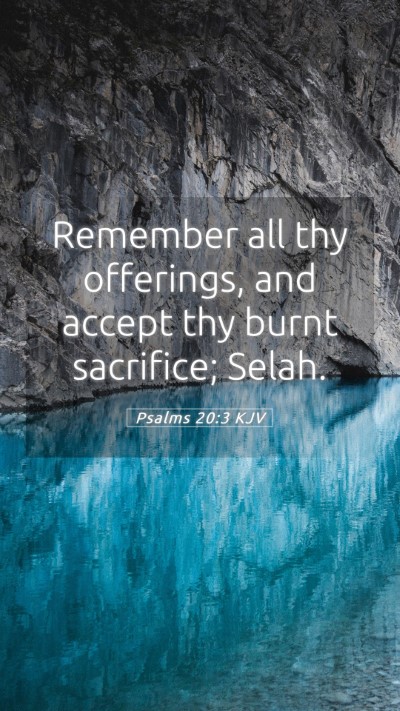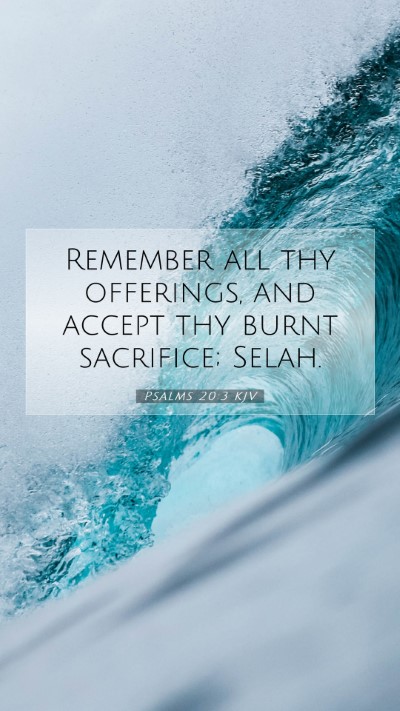Bible Verse Commentary: Psalms 20:3
Bible Verse (Psalms 20:3): "May he remember all your offerings and regard with favor your burnt sacrifices."
Understanding Psalms 20:3
This verse from Psalms is often interpreted as a prayer for divine favor and acknowledgment of personal offerings to God. In this moment, the psalmist expresses a desire for God to remember the sacrifices made by His people, showing that these acts of devotion are significant and valued in the sight of the Lord. Below, we will explore several key insights based on public domain commentaries from noted biblical scholars.
Insights from Commentaries
-
Matthew Henry's Commentary:
Henry reflects on the importance of God recognizing the offerings of His people. He suggests that this acknowledgment is integral to the relationship between the believer and God. The psalm points out that sacrifices are not mere rituals; they signify a deeper commitment and dedication to divine service.
-
Albert Barnes' Notes:
Barnes underscores the notion that the 'offerings' referred to can include a range of acts, from material gifts to spiritual sacrifices. He illustrates that God’s favor is linked to the sincerity and faith of the giver. The verse serves as a reminder that sincere worship extends beyond the act of giving, encompassing the heart and intentions of the worshipper.
-
Adam Clarke's Commentary:
Clarke discusses how the phrase 'burnt sacrifices' highlights the total commitment required by these offerings. He points out that a burnt sacrifice was entirely consumed by fire, reflecting the idea of giving oneself wholly to God. This notion encourages believers to assess their own offerings and the extent of their devotion.
Key Themes in Psalms 20:3
- Divine Favor: The request for God to remember offerings indicates a pursuit for divine favor, which entails a relationship built on trust and faithfulness.
- Acknowledgment of Worship: The verse highlights the importance of acknowledging the worship of God in our lives. Believers can take comfort in knowing that their spiritual endeavors are not overlooked.
- Intent of Sacrifice: This passage suggests that the intention behind sacrifices is crucial, emphasizing the need for heartfelt offerings over mere observance of tradition.
Application in Daily Life
Psalms 20:3 encourages individuals to reflect on their own sacrifices and offerings in their lives. It invites believers to consider how they can actively demonstrate their faith through acts of devotion, highlighting the energy of giving—whether that be time, resources, or love—toward serving God and others:
- Consider what offerings you can present to God in your daily life.
- Engage in self-reflection and evaluate the state of your spiritual journey.
- Participate in communal worship, contributing to faith-based groups and support systems.
Related Bible Cross References
- Psalms 51:17 - "The sacrifices of God are a broken spirit; a broken and contrite heart, O God, you will not despise."
- Hebrews 13:15 - "Through him then let us continually offer up a sacrifice of praise to God, that is, the fruit of lips that acknowledge his name."
- Romans 12:1 - "I appeal to you therefore, brothers, by the mercies of God, to present your bodies as a living sacrifice, holy and acceptable to God, which is your spiritual worship."
Conclusion
In summary, Psalms 20:3 serves as a powerful reminder of the significance of our offerings to God and the intimate relationship He desires with us. This passage encourages believers to offer sincere sacrifices that resonate with true devotion, thus enjoying the blessings of divine favor. Moreover, engaging with such scripture not only enriches biblical understanding but also enhances one's spiritual journey through various Bible study resources and community discussions.


